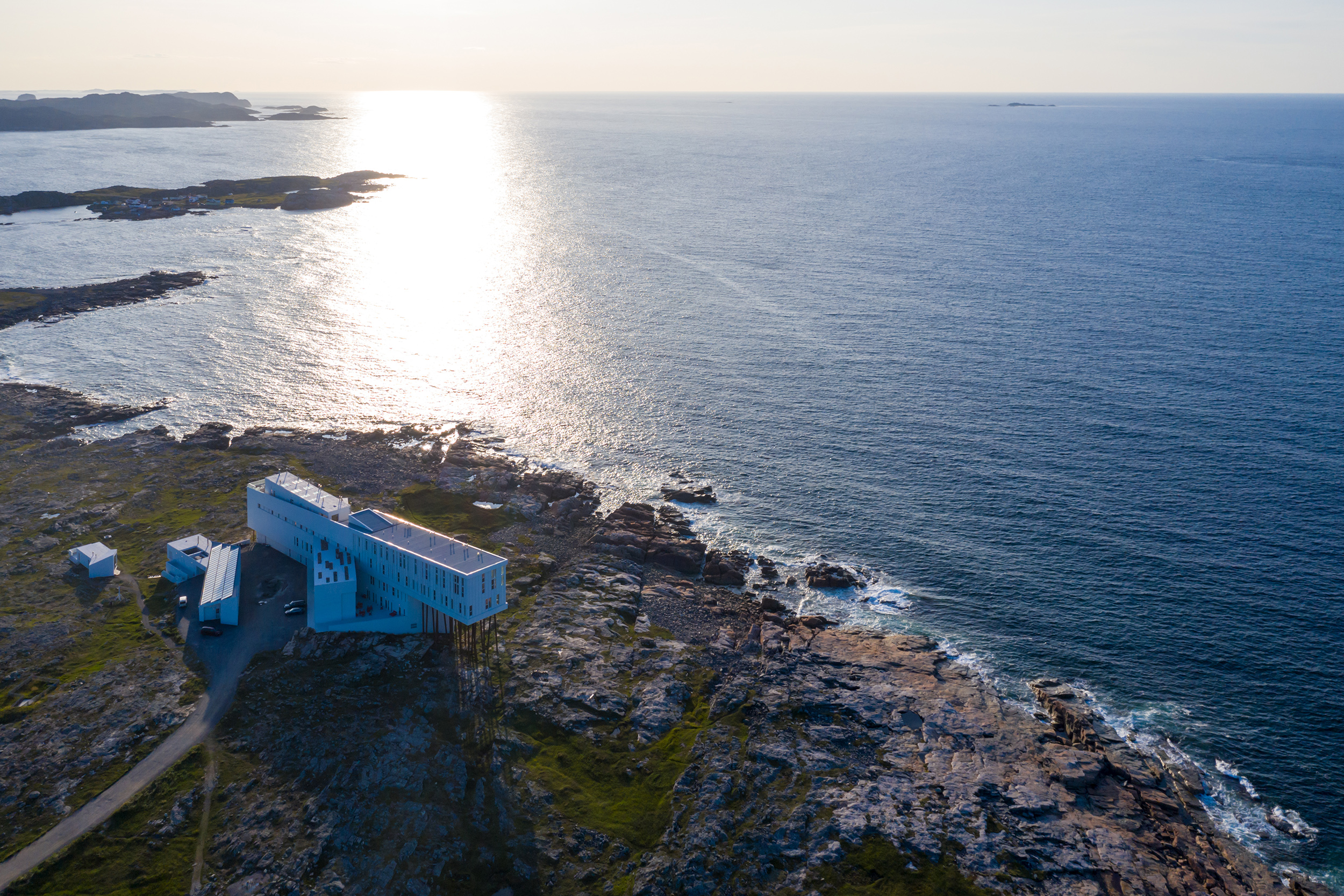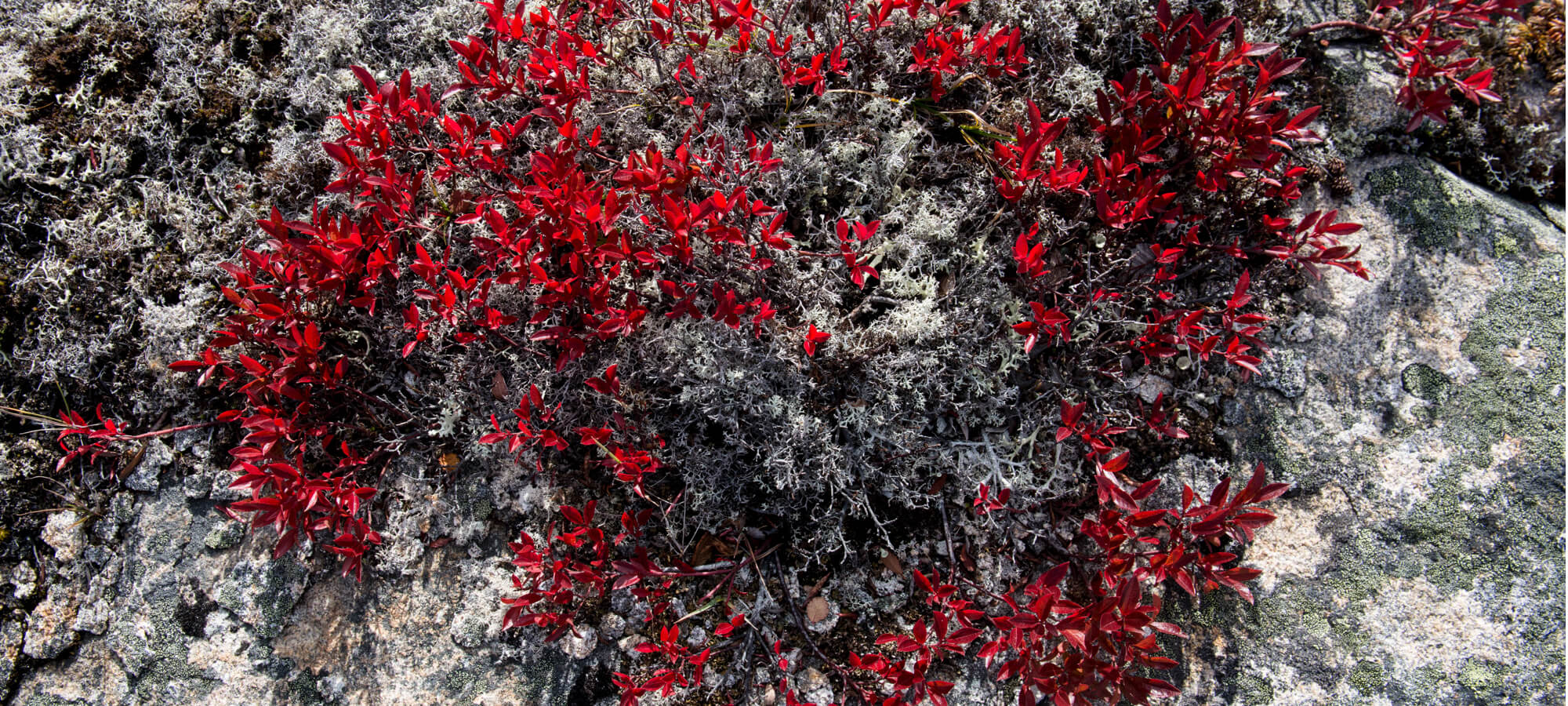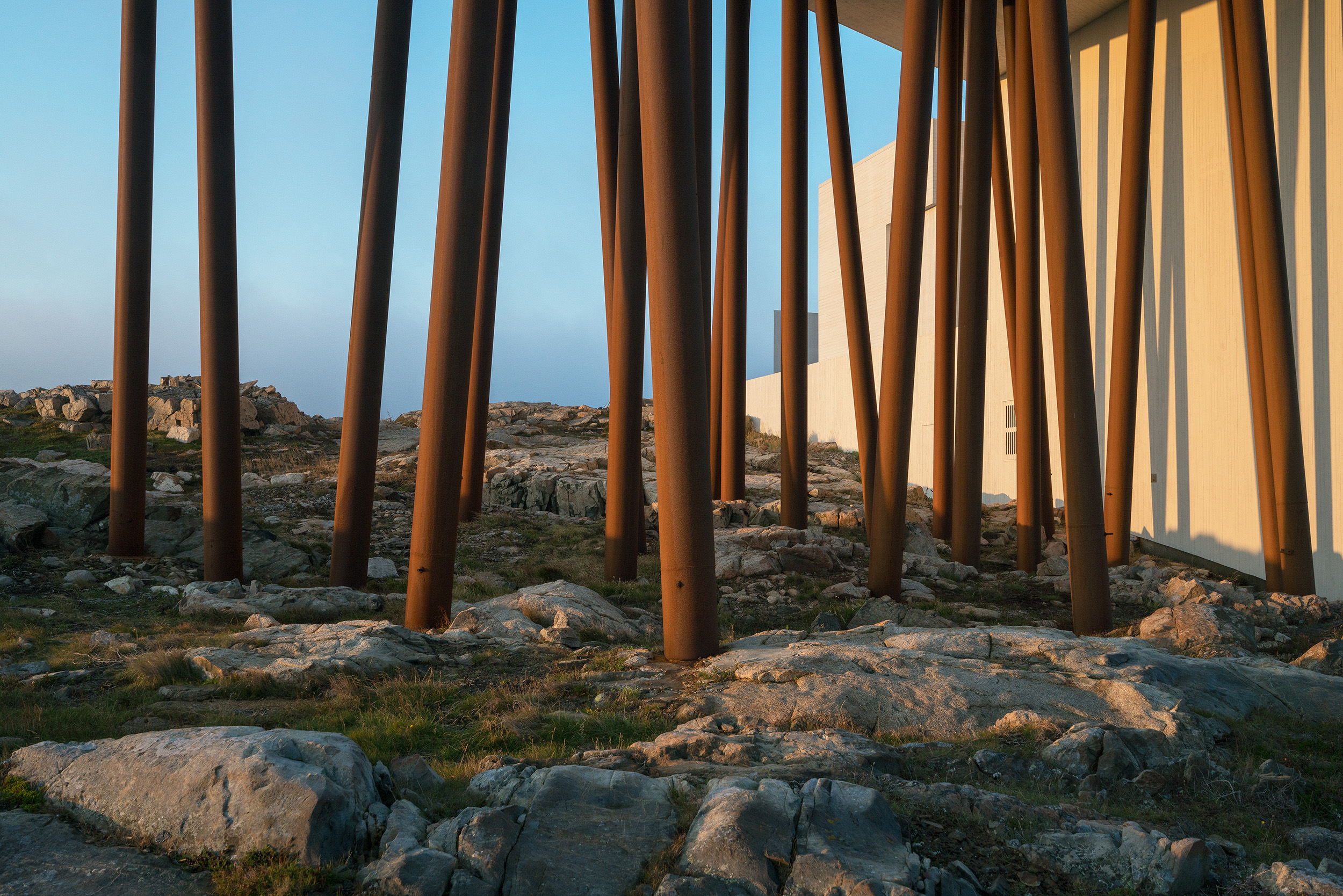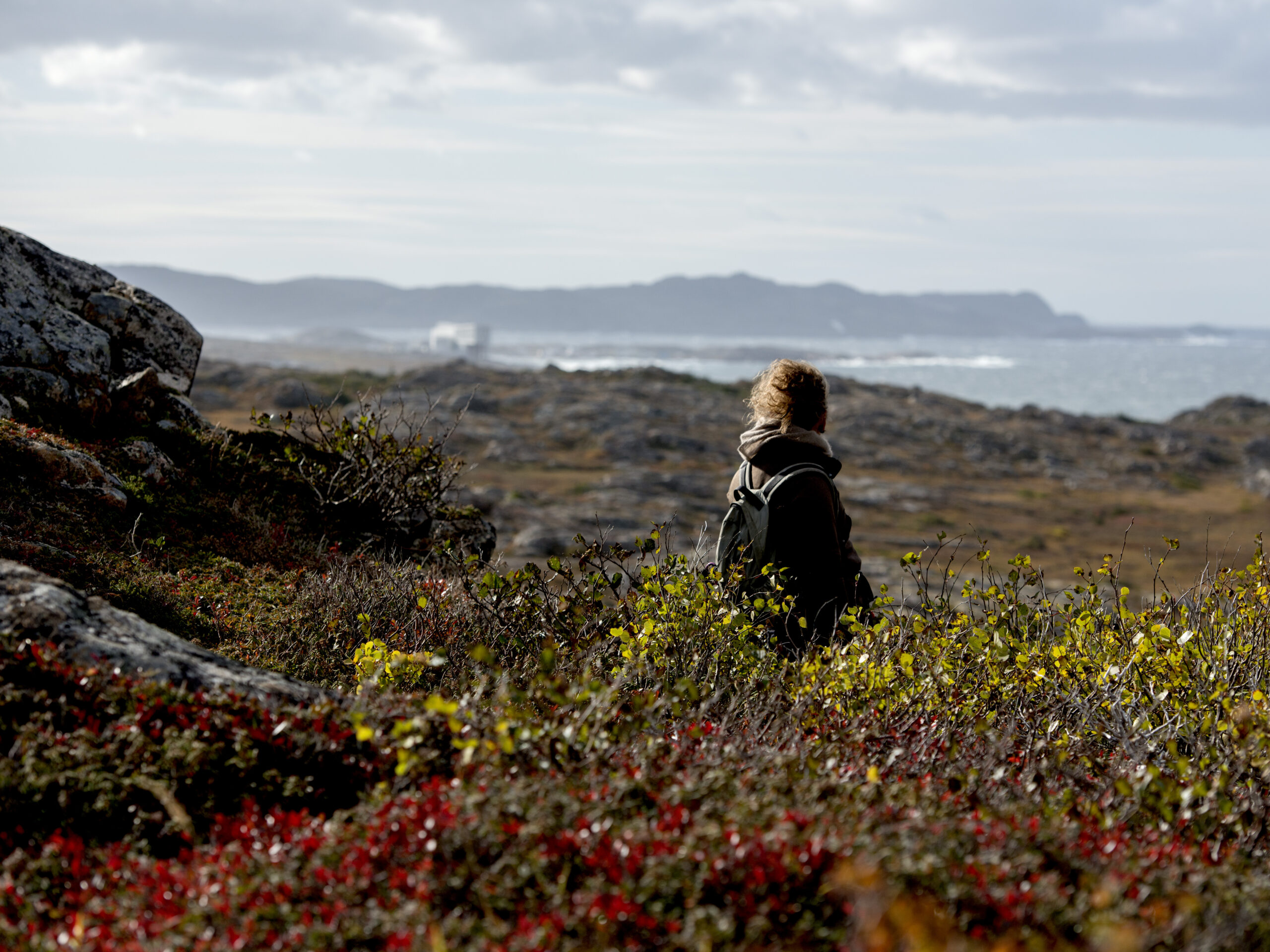A Gentle Footprint
Fogo Island Inn is the embodiment of an ecological ethic.
Our Guiding Principle: To meet the needs of the present generation with deep respect for the needs of future generations and the sacredness of the natural world.
An Inn Designed for Nature, Culture, and Human Life
Fogo Island Inn is an ambitious project grounded in absolute commitment to the most responsible and forward-looking environmental practices possible. We conceived of it with E.F. Schumacher’s words in mind, “nature and culture are the two great garments of human life,” and we constantly endeavour to protect and regenerate our precious natural resources.
We built the Inn with deep reverence for the environment, using the most sustainable materials and responsible practices, every step of the way—even when it meant doing things the hard way. As our architect Todd Saunders says, in the documentary Strange and Familiar, "the Inn walks gently on the land."
We operate the Inn with a rigorous environmental stewardship strategy, which we are constantly reviewing and updating as we learn more and listen to what nature is telling us. In doing so, we hope to inspire others in our industry to do better and become leaders themselves.
Here are our key environmental initiatives:
We built the Inn using regenerative design principles.
The mandate we gave architect Todd Saunders was to design a property that would stand at least 100 years and embody the fabric of this place—both culturally and materially. Building things to last, with a deep respect for the local and sustainable, expresses both faith in our community’s future and mindfulness of our planet’s natural resources.
We chose to build the Inn at a scale that made sense for the size of Fogo Island, to mitigate over-tourism and show respect for natural resources and the local infrastructure. With only 29 rooms, there is a manageable flow of guests with whom we can responsibly share the natural environment here, without disturbing the peace and the animal and plant life.
In our approach to hospitality, we nurture a profound understanding of this island in the Labrador Current. An optimum ratio of guests to staff means we can foster deep engagement with the natural world of the boreal forest and the subarctic landscapes of bogs, and barrens. It also allows us to nurture guests’ curiosity in the culture that has emerged over centuries of making a living in this rugged, singular place that has been shaped by the North Atlantic.
These architectural elements have a gentler impact on the environment:
- A non-destructive low-impact foundation reduced concrete needs for the Inn’s construction.
- The Inn’s steel frame is highly insulated, and likewise our windows have the equivalent rating of triple-pane glazing, which prevents drafts and conserves heat.
- For the wood cladding of the exterior and interior of the Inn, we sourced local woods (black spruce and yellow birch) from a carefully managed forest from nearby on the mainland of Newfoundland, just across the Hamilton Sound, the body of water that separates Fogo Island from the island of Newfoundland.
- The outbuilding was designed—both in form and size—to house enough thermal roof panels and wood-fired boilers to supply hot water for the in-floor radiant heating of the Inn as well as laundry and kitchen equipment. The angle of the roof was slanted for optimum function of the solar panels.
- The air inside the property is kept healthier, cleaner, and more comfortable by heat recovery ventilators (HRVs). These energy-efficient units continuously replace indoor air with fresh outdoor air—in fact, our building does a total air exchange every 15 minutes. When it’s cold outside, HRVs capture warmth from air leaving the building and use it to pre-heat fresh air entering the building. In the warmer months, it extracts heat from incoming air and transfers it to outgoing air, keeping the building cool.
- The placement of the main Inn structure and the adjacent outbuilding creates a sheltered entry court, which reduces the impact of the elements, simply through thoughtful design.
- To lessen the impact on the land during construction, we collected the mosses, grasses, and other plants on the building site, and returned them the site when the construction was complete.
- Installing underground communication and electrical systems, as well as water pipes, beneath our driveway, mitigated disturbance to the natural habitat.
- Wherever possible, we avoided using plastics in the design and construction of the Inn. The notable exception was the communications technology equipment, where there was no non-plastic alternative.
- We chose the Inn site and designed access paths in such a way that we could preserve an ancient footpath.
- We use a system to collect and filter rainwater for use in our toilets and laundry and kitchen appliances. Fogo Island Inn is a pioneer in sustainable greywater management: the first hotel in Newfoundland to ecologically treat wastewater (septic). We also have a primary sewerage treatment system, with residual sludges taken off Fogo Island to be treated and disposed of responsibly.
- Our building and landscaping materials of choice were natural and local, from the wood panelling of the structure to the rocks from the landscape around the Inn.
- All the furniture pieces at the Inn were made locally, by hand, with wood sourced as close to home as possible to lighten our carbon footprint. Our textile pieces were stitched, knitted, crocheted and hooked on Fogo Island too.
- We keep all the lighting around the Inn at the lowest levels possible so as not to interfere with the right to darkness that belongs to every human, as well as other creatures.
- Four heat recovery systems redirect heat from our mechanical equipment to help heat the building. The Inn has a high-efficiency wood-burning heating system (wood stoves in the majority of guest rooms and wood-burning fireplaces in public spaces). We use Hydro power—a clean and renewable energy source—not fossil fuels.
We always examine if we can source things locally first, before sourcing goods and services from further afield.
When we need to source something for the Inn, whether that’s turnips for the kitchen, linens for guest rooms, or ladders for the construction team, we start by seeking Fogo Island suppliers. This reduces the pollution that comes with long-distance transportation and supports local businesses too. We only go further afield if we can’t source what we need on Fogo Island. In those cases, we follow this chain:
- Fogo Island
- Our closest communities on mainland Newfoundland
- The province of Newfoundland and Labrador
- Canada
- North America
- Our traditional international trading partners
- The rest of the world*
(*Only if the product is made or service is delivered from jurisdictions that meet our expectations of proper environmental and labour standards.)
We are transparent about where the money goes.
Shorefast’s Economic Nutrition Certification Mark, shows exactly how the cost of your stay contributes to the local and global economy. The Inn consistently surpasses the requirements of environmental laws, only accepting goods and services from suppliers and manufacturers in jurisdictions that meet our benchmarks for environmental and labour standards.
We are intentional with food resources.
Knowing where our food comes from is a first step in ensuring that the dining experiences we offer are ethically and environmentally responsible.
- In our Dining Room, we serve seafood and fish harvested in the waters around Fogo Island, including Fogo Island Fish handline cod, which is Oceanwise recommended.
- Our Kitchen team follows the “80/20” rule: 80% of ingredients they use are fished, farmed, hunted, or harvested from Fogo Island. The other 20% (including ingredients such as chocolate, coffee, and spices) are sourced from as close to home as possible and from traditional trading partners.
- To achieve a zero-waste kitchen, we are exploring the potential of a comprehensive composting program.
- We use every edible part of an ingredient—from bones to herb stalks to carrot tops—and favour made-to-order dishes over buffet-style offerings, as well as quality and nutritional density over excess.
We keep the guest experience green.
Small actions add up, so we pay attention to the details, during our guests’ time at the Inn.
- In our guest rooms and Dining spaces, we’ve been cycling out cotton in favour of more earth-friendly flax-based linen.
- We provide refillable steel water bottles to all guests and do not offer straws or single-use plastic cutlery, to keep plastic out of landfill.
- The environmentally friendly toiletries in our bathrooms are produced locally in St. John’s, NL.
- Our Obasan mattresses are made from ethically sourced GOTS- and GOLS-certified organic materials (cotton, wool, sustainably harvested rubber). The mattresses are all handcrafted in Ottawa, Canada.
- The interior of the property is illuminated with 85% LED lightbulbs.
We provide lower-energy transportation options.
Once guests have arrived, they can get around in ways that have minimal impact on the planet. We offer electric vehicles and charging stations on site, and we also lend equipment such as touring bikes, snowshoes, skates, and cross-country skis. The island’s trail system lends itself well to self-powered activities such as hiking, running, and snowshoeing.
We offer carbon offsetting.
Our partnership with Carbonzero allows guests to opt in for a carbon-neutral stay. We can calculate the approximate carbon emissions associated with everything from travel to heating and electricity use to dining and activities. When guests purchase carbon offsets, they are supporting a carbon-offsetting project in Stephenville and Appleton-Glenwood, Newfoundland.
We are mindful of paper consumption.
In our administrative operations, we are working towards a significant reduction in operational paper use and transitioning to 100% recycled paper, to conserve natures resources.
We partner with likeminded organizations.
Working with others provides opportunities to show leadership and stay informed of the latest science, solutions and best environmental practices. Fogo Island Inn is a member of Regenerative Travel, a collection of independent hotels and resorts regenerating people and place. Our sister social business, Fogo Island Fish, our main seafood supplier, has Oceanwise accreditation for its handlined cod. Oceanwise is a globally focused conservation organization whose mission is to protect and restore the world’s oceans.
We operate as a community enterprise that helps fund Shorefast’s environmental initiatives.
Fogo Island Inn is a community asset founded by Shorefast, a registered Canadian charity with the mandate to promote social, economic and ecological resiliency for Fogo Island. The Inn is a 100% community enterprise: all operating surpluses are reinvested in the community of Fogo Island through the projects and programs of Shorefast. Their initiatives in relationship to nature and the environment include:
- New Ocean Ethic
- Exploration into regenerative seaweed farming
- Geology at the Edge Program
- Community Science Association
- Eider duck shelter habitat conservation program
- Plastic bag ban on Fogo Island



